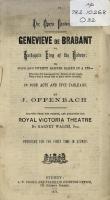A pantomime version of Garnet Walch's own adaptation of the Offenbach operetta, this production included the traditional transformation scene and harlequinade. The Sydney Morning Herald's theatre critic viewed the seasonal treatment in a positive light, although noting that the music suffered somewhat. 'Instead of hashing up an English burlesque and converting it into the opening of a pantomime', notes the review:
The lessee very sensibly adopted the plan of taking the latest and most eccentric of Offenbach's operas, Genevieve de Brabant, and making that the starting point for the Harlequinade ... The opera of itself was a treat, although much of its music is lost in consequence of the cast being short of the necessary voices, and much of the libretto had to be converted into dialogue (27 December 1873, p.5).
Walch's original burlesque production, commissioned by W. S. Lyster, was possibly translated and adapted from Offenbach's 1867 revised version (see note below). The story is based loosely on a legend dating back to the 13th century, in which the wife of the Duke of Brabant is accused of being unfaithful while her husband is absent. A further complication is that the duke and duchess are unable to have a child due to a curse having been placed on them. The false accusation has been levelled by the prime minister, who wishes to take control of the country himself. His plan is defeated, however, by Genevieve (with the help of a loyal pastry-cook).
The storyline for the earlier burlesque version, upon which the pantomime is based, begins with the duke, Cocorico, being advised that political troubles are likely to arise in Brabant on account of disputed succession to the ducal throne. While discussing the problem, the duke is served a wonderful pie, but it instead makes him feel poorly. In the midst of his temporary indisposition, he is visited by Charles Martel, a paladin, who convinces him to go to Palestine on a crusade. They subsequently depart France via the Great Northern Railroad. With the duke now absent, Golo, Prime Minister of Brabant, plots to overthrow the duke by having his wife accused of adultery. He is aided in his scheme by the burgomaster, but they are frustrated by the genial and kindly influences of Drogan. When the Duke eventually returns, the conspirators are unmasked (and pardoned), and the happiness of the entire population is expressed in an ecstatic fandango, as was customary in those days of Arcadian simplicity (Argus 13 September 1873, p.5).
The pantomime, like the burlesque production, incorporated numerous topical and local hits at persons, issues, and events into the dialogue.
 5004238169181447396.jpg
5004238169181447396.jpg
 Genevieve de Brabant ; Or, Harlequin King of the Bakers, or, Four and Twenty Bakers Baked in a Pie, When the Pie was Opened the Bakers all did Chant - Wasn't that a Funny Dish to Place Before Brabant
single work
pantomime
-
Four acts and five tableau
Genevieve de Brabant ; Or, Harlequin King of the Bakers, or, Four and Twenty Bakers Baked in a Pie, When the Pie was Opened the Bakers all did Chant - Wasn't that a Funny Dish to Place Before Brabant
single work
pantomime
-
Four acts and five tableau

